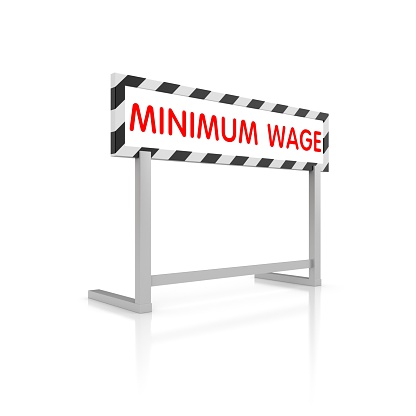Legislature’s bad decision on minimum wage premiers today in Aurora
DENVER, Sept. 21, 2020—No other state in the Rocky Mountain region is doing this to itself, and tonight’s meeting of the Aurora City Council will show why—unless enough councilmembers with an ounce of common economic sense prevail.
On the council’s study session agenda, which begins at 5:30 p.m., is a 14-page proposal to require all businesses in Aurora to pay a minimum wage of $20 an hour, which will be implemented in increments up to Jan. 1, 2027. Flush with funds Aurora must be, the city’s director of finance, Terri Velasquez, also in the same packet of information, writes, “Since the minimum wage rates would be higher than the state of Colorado’s minimum wage, monitoring and/or auditing of compliance (based on alleged violations) will fall to the City. Based on discussions with Denver, the Tax and Licensing Manager estimates the following annual enforcement costs. Supervisor $135,000 2 Staff Analysts $190,000 Expenses and Training $8,000 Total $333,000.”
Aurora’s ability to require a minimum wage higher than the state’s rate comes from last year’s legislative passage of House Bill 19-1210, which allows all local governments the power to do so.
“We argued loudly, strenuously, and repeatedly against this economically destructive bill,” said Tony Gagliardi, Colorado state director for NFIB, the state’s leading small-business association. “Its easily foreseeable problems such as job losses, business closures, and paperwork compliance nightmares have only been exacerbated by the coronavirus. No other state in our region has shot itself in the foot in such a way. In fact, Idaho passed a law prohibiting all its levels of government from establishing a minimum wage rate higher than the federal governments, and it was crushing Colorado in job-creation before the coronavirus struck. For the sake of Colorado’s economic recovery, I hope the adults on the Aurora City Council prevail and the Legislature considers re-locking the Pandora’s Box it opened with HB 19-1210.”
Gagliardi offered the following realities about the minimum wage for anyone sincerely concerned with the issue:
- Only 1.9 percent of all workers are earning a minimum wage, according to the latest U.S. Bureau of Labor Statistic’s Characteristics of minimum wage workers, 2019 (first paragraph)
- “Minimum wage workers tend to be young. Although workers under age 25 represented only about one-fifth of hourly paid workers, they made up about two-fifths of those paid the federal minimum wage or less. Among employed teenagers (ages 16 to 19) paid by the hour, about 6 percent earned the minimum wage or less, compared with about 1 percent of workers age 25 and older.” (BLS report above)
- “Within that tiny group, most of these workers are not poor and are not trying to support a family on only their earnings. In fact, according to a recent study, 63 percent of workers who earn less than $9.50 per hour (well over the [federal] minimum wage of $7.25) are the second or third earner in their family and 43 percent of these workers live in households that earn over $50,000 per year. Thus, minimum wage earners are not a uniformly poor and struggling group; many are teenagers from middle class families and many more are sharing the burden of providing for their families, not carrying the load all by themselves.” – economist Jeffrey Dorfman, Almost Everything You Have Been Told About The Minimum Wage Is False, Forbes.
- “Multiple studies confirm that a majority of minimum wage employees–who are disproportionately young and less-educated–earn a raise within one to 12 months on the job. For employees who are older and /or have children, better alternatives exist—including the Earned Income Tax Credit, which operates through the tax code instead of a mandate on employers.” – Michael Saltsman, Fighting $15 An evaluation of the evidence and case for caution, Employment Policies Institute
- “… evidence simply does not provide a strong case for using minimum wages to reduce poverty. Similarly, recent research does not provide conclusive evidence that a higher minimum reduces government spending on welfare and other programs to support poor families, with the possible exception of food stamps.” – David Neumark, Reducing Poverty Via Minimum Wages, Alternatives, Federal Reserve Bank of San Francisco.
Keep up with the latest Colorado small-business news at www.nfib.com/colorado or by following NFIB on Twitter @NFIB_CO or on Facebook @NFIB.CO
Contact: Tony Gagliardi, Colorado State Director, 303-325-6243, [email protected],
or Tony Malandra, Senior Media Manager, 415-640-5156, [email protected]
###
For more than 77 years, NFIB has been advocating on behalf of America’s small and independent business owners, both in Washington, D.C., and in all 50 state capitals. NFIB is a nonprofit, nonpartisan, and member-driven association. Since its founding in 1943, NFIB has been exclusively dedicated to small and independent businesses and remains so today. For more information, please visit nfib.com.
NFIB Colorado
1700 Lincoln Street, 17th Floor
Denver, CO 80203
303-860-1778
www.nfib.com/colorado
Twitter: @NFIB_CO
Facebook: NFIB.CO

